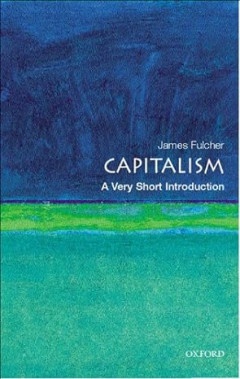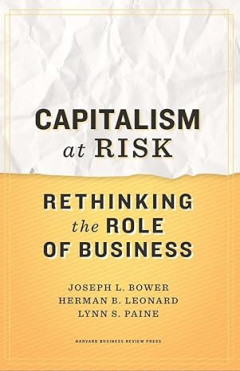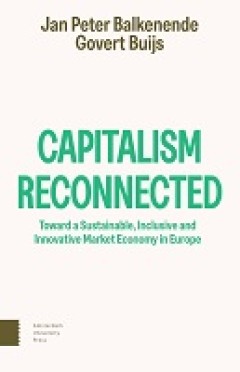Ditapis dengan
E-book Capital Redefined
At the heart of our intellectual journey in this book lies the profound realiza-tion that in order to redefine capital, we must first engage in a transforma-tive discourse that places (redefining) value at its very core. In the face of an imminent convergence of ecological and social crises, it becomes increas-ingly evident that the immense influence wielded by capital is at the core o…
- Edisi
- -
- ISBN/ISSN
- 9781003805588
- Deskripsi Fisik
- 140 hlm
- Judul Seri
- -
- No. Panggil
- 330.112 HOS c
E-book China’s capitalist Transformation : The Rhetoric that Mattered
Chinese intellectuals like to blame things on institutions. After all, Chinese people areindustrious, prudent, and entrepreneurial. Yet modern Chinese history since theopium war has been characterized by one humiliation after another, and althoughthe founding of communist China gave the country independence, it came at the costof being self-isolated from the world and having a poor economy. Wha…
- Edisi
- -
- ISBN/ISSN
- 9783110773248
- Deskripsi Fisik
- 235 hlm
- Judul Seri
- -
- No. Panggil
- 330.11251 YUA c
E-book Populism : Origins and Alternative Policy Responses
In 1969, an influential volume arising from a conference at LSE began with a declaration phrased to echo Marx and Engels: ‘A spectre is haunting the world: the spectre of populism’ [1]. More than half a century has gone by, and the warning re-mains timely. Donald Trump may be gone from the White House, but populism is still a powerful force in world politics. …
- Edisi
- -
- ISBN/ISSN
- 9781909890923
- Deskripsi Fisik
- 161 hlm
- Judul Seri
- -
- No. Panggil
- 330.112 VRI p
E-book Plantation Crisis : Ruptures of Dalit life in the Indian tea belt
Many people have grown up, lived, worked and died on Indian tea plantations. Although a small number have left in search of a better life elsewhere, they have often been replaced by their relatives. However, most workers have not experienced a life outside the plantations, which have cocooned their families for generations. Therefore, when long-standing owners be…
- Edisi
- -
- ISBN/ISSN
- 9781800082274
- Deskripsi Fisik
- 230 hlm
- Judul Seri
- -
- No. Panggil
- 330.112 RAJ p

E-book Poor Man's Fortune : White Working-Class Conservatism in American Meta…
This book is about white working-class American men who opposed social democratic labor unions and politics in the century that culminated in the New Deal. It follows five generations of miners who, beginning in the 1850s, discovered and developed a rich swath of zinc and lead that straddled the boundaries between Missouri, Kansas, and Oklahoma. By the 1920s, the Tri-State district le…
- Edisi
- -
- ISBN/ISSN
- 9781469656304
- Deskripsi Fisik
- 357 hlm
- Judul Seri
- -
- No. Panggil
- 330.112 ROL p

E-book Capitalism: A Very Short Introduction
What is capitalism? Is capitalism the same everywhere? Is there an alternative? The word 'capitalism' is one that is heard and used frequently, but what is capitalism really all about, and what does it mean? The book begins by addressing basic issues such as 'what is capital?' before discussing the history and development of capitalism through three detailed and absorbing case studies rangin…
- Edisi
- -
- ISBN/ISSN
- 0192802186
- Deskripsi Fisik
- 153 halaman
- Judul Seri
- -
- No. Panggil
- 330.112 FUL c 002829-eB-0122

E-book Capitalism at Risk: Rethinking the Role of Business
The spread of capitalism worldwide has made people wealthier than ever before. But capitalism’s future is far from assured. The global financial meltdown of 2008 nearly produced a great depression. Economies in Europe are still teetering. Income inequality, resource depletion, mass migrations from poor to rich countries, religious fundamentalism?these are just a few of the threats to continui…
- Edisi
- -
- ISBN/ISSN
- -
- Deskripsi Fisik
- 265 halaman
- Judul Seri
- -
- No. Panggil
- 330.112 BOW c
E-book Rebel Cities : From the Right to the City to the Urban Evolution
We live in an era when ideals of human rights have moved centerstage both politically and ethically. A lot of political energy is put into promoting, protecting, and articulating their significance in the construction of a better world. For the most part the concepts circulating are individualistic and property-based and, as such, do nothing to challenge hegemonic liberal and neoliberal market …
- Edisi
- -
- ISBN/ISSN
- 9781844679041
- Deskripsi Fisik
- 206 hlm
- Judul Seri
- -
- No. Panggil
- 330.112 HAR r

E-Book Capitalism Reconnected: Toward a Sustainable, Inclusive and Innovative…
Capitalism has gone astray. Today we face ecological exhaustion, persistent inequality, financialization, stress on communities, short-termism, and new power concentrations. An avalanche of new economic thinking and a reorientation of European values show the way toward a different economy. A new perspective is necessary if we want to implement the Sustainable Development Goals and if we consid…
- Edisi
- -
- ISBN/ISSN
- 9789048562633
- Deskripsi Fisik
- 401 halaman
- Judul Seri
- -
- No. Panggil
- 330.112 BAL c
E-book The Class Struggle
The program adopted by the German Social Democracy at Erfurt in 1891 divides itself into two parts. In the first place it outlines the fundamental principles on which Socialism is based, and in the second it enumerates the demands which the Social Democracy makes of present day society. The first part tells what Socialists believe; the second how they propose to make their belief effective. We …
- Edisi
- -
- ISBN/ISSN
- -
- Deskripsi Fisik
- 194 hlm
- Judul Seri
- -
- No. Panggil
- 330.112 KAU t
 Karya Umum
Karya Umum  Filsafat
Filsafat  Agama
Agama  Ilmu-ilmu Sosial
Ilmu-ilmu Sosial  Bahasa
Bahasa  Ilmu-ilmu Murni
Ilmu-ilmu Murni  Ilmu-ilmu Terapan
Ilmu-ilmu Terapan  Kesenian, Hiburan, dan Olahraga
Kesenian, Hiburan, dan Olahraga  Kesusastraan
Kesusastraan  Geografi dan Sejarah
Geografi dan Sejarah